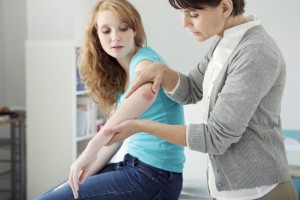Honoring Psoriasis Awareness Month During August
 Were you aware that August is designated as National Psoriasis Awareness Month? Throughout the month, the National Psoriasis Foundation has been working hard to support awareness events and walks across the country. They want more people to learn about this common skin condition, and how individuals and their families can learn to cope with this disease if it’s in their life.
Were you aware that August is designated as National Psoriasis Awareness Month? Throughout the month, the National Psoriasis Foundation has been working hard to support awareness events and walks across the country. They want more people to learn about this common skin condition, and how individuals and their families can learn to cope with this disease if it’s in their life.
How much do you know about psoriasis? Well, we have compiled a few questions to test your knowledge of this disease:
- Can psoriasis be spread from patient to patient just through touching someone who has it? Answer: Despite what many people mistakenly believe, psoriasis is not contagious. It is an autoimmune disease which you can’t catch from anyone else.
- Can psoriasis even be treated effectively? Answer: While there is no cure for psoriasis, there are a variety of treatments which can help people manage the symptoms of their condition.
- If I don’t have the best hygiene, does that make me more susceptible to developing psoriasis? Answer: Again since it is an autoimmune disease, the development of psoriasis has nothing to do with your personal hygiene.
- I have always wondered if psoriasis is just a cosmetic condition? Answer: While the most common symptoms of psoriasis include those patches of scaly skin, this is an autoimmune disease and it can affect the entire body.
- Aren’t the symptoms of psoriasis only physical in nature? Answer: As numerous studies have shown, this disease can have a significant emotional impact on patients.
The Origin of Psoriasis
Psoriasis develops after the immune system has begun to transmit faulty signals leading to an accelerated cycle of skin cell grow. This produces the tell-tale red, painful patches on the patient’s skin. These patches will itch, crack, and even bleed on occasion. However, the symptoms can vary and for that reason there are actually five main types of psoriasis: plaque psoriasis (the most common), inverse psoriasis, guttate psoriasis, inverse psoriasis, and erythrodermic psoriasis.
Nearly 7.5 million Americans are living with some form of psoriasis, making it the most common autoimmune disease in the U.S. (outpacing both rheumatoid arthritis and lupus). Cases often range from mild to severe, but it can develop at any age and on any part of the body. Although, it can be fairly easy to mistake these symptoms for other common skin conditions like eczema or dermatitis.
Support Psoriasis Research and Awareness
Learning as much as you can about psoriasis is important, not only for the people who are diagnosed with it, but their loved ones as well. Knowledge is power, and you’d be surprised by how much help you can offer someone if you are more knowledgeable.
The National Psoriasis Foundation would like you to know that you can still make a real difference this Psoriasis Awareness Month. If you’d like to make a donation to support more research and psoriasis clinical trials, the foundation has a donation page set up here. If you are looking for other ways to get involved, you could also take part in one of the Walks to Cure Psoriasis. If you are a resident in Anaheim, CA, then you may be interested in taking part in the San Diego Walk during October.